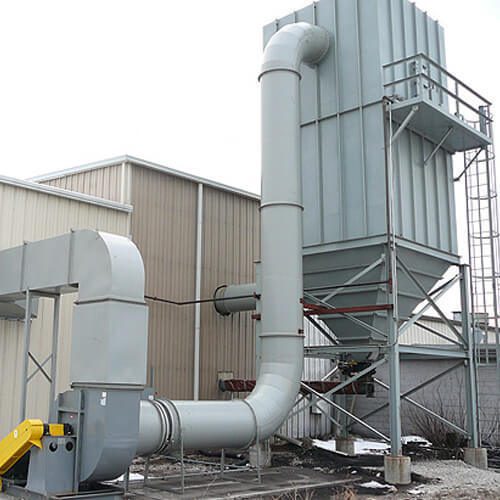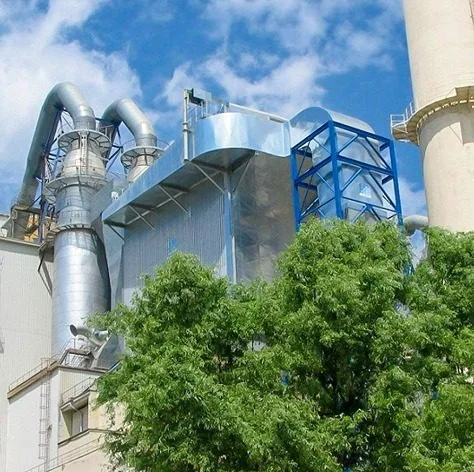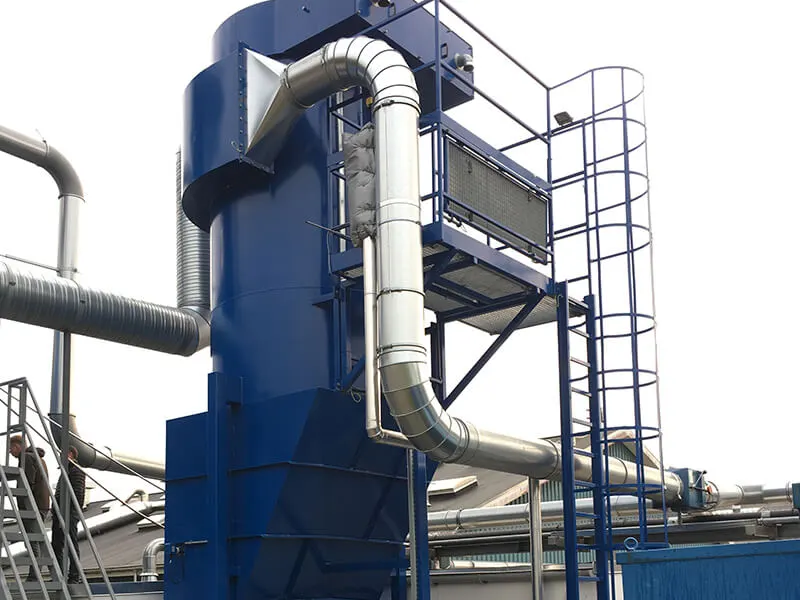Understanding Industrial Air Filtration Systems
Industrial air filtration systems play a crucial role in maintaining a clean and safe environment within manufacturing facilities, production units, and processing plants. These advanced systems are specifically designed to remove airborne dust, contaminants, and harmful particles, ensuring that the air remains free from pollutants that could pose health risks to workers. By effectively capturing and filtering out impurities, air filtration systems contribute to a healthier workplace while also enhancing overall air quality.
Various industries, including pharmaceuticals, food processing, metalworking, and chemical manufacturing, rely extensively on air filtration solutions to meet stringent regulatory standards and maintain optimal working conditions. Compliance with air quality regulations is not only a legal necessity but also a critical factor in safeguarding employee well-being and preventing respiratory issues caused by prolonged exposure to airborne pollutants.
Beyond health concerns, the presence of dust and contaminants in industrial settings can lead to significant operational challenges. Accumulated particles can cause premature wear and tear on machinery, reducing equipment efficiency and leading to frequent maintenance or costly repairs. Moreover, airborne pollutants can negatively impact product quality in sensitive manufacturing processes, leading to defects or contamination. Reduced air quality can also lower productivity levels by creating an uncomfortable and hazardous working environment.
Investing in a high-quality industrial air filtration system is, therefore, essential for long-term sustainability and operational efficiency. A well-designed filtration system helps in minimizing downtime, prolonging equipment lifespan, and ensuring compliance with environmental and safety regulations. By prioritizing clean air solutions, industries can create a safer workspace, improve worker health, and enhance overall productivity, ultimately contributing to a more sustainable and efficient industrial operation.

Importance of Industrial Air Filtration
Air pollution in industrial environments can have severe and far-reaching consequences, impacting both human health and machinery performance. Prolonged exposure to fine particles, chemical fumes, and toxic gases poses significant health risks to employees, leading to respiratory issues, allergies, and long-term complications such as chronic lung diseases or cardiovascular problems. Poor air quality not only endangers workers but also affects overall workplace productivity, as employees experiencing health issues may face increased absenteeism and reduced efficiency.
Beyond human health concerns, airborne contaminants can severely impact industrial equipment and machinery. Dust, debris, and chemical residues can accumulate on sensitive components, causing blockages, overheating, and mechanical wear. This leads to decreased efficiency, frequent breakdowns, and costly repairs, ultimately disrupting production processes and increasing maintenance expenses. Over time, poor air quality can result in significant financial losses due to unplanned downtimes and reduced equipment lifespan.
Industrial air filtration systems play a pivotal role in mitigating these risks by effectively capturing and removing harmful airborne contaminants before they can spread throughout the workplace. By ensuring a cleaner and healthier environment, these systems help businesses comply with stringent environmental and occupational safety regulations. Maintaining proper air filtration not only enhances workplace safety but also reduces legal liabilities, improves regulatory compliance, and minimizes operational disruptions. Investing in high-quality air filtration solutions is, therefore, essential for sustaining a safe, efficient, and productive industrial operation.
Key Components of an Industrial Air Filtration System
An industrial air filtration system comprises several components that work together to remove impurities from the air. The primary elements include:
- Pre-Filters – These capture large particles like dust, fibers, and debris, preventing them from entering the main filtration unit.
- HEPA Filters – High-Efficiency Particulate Air (HEPA) filters trap ultra-fine particles, ensuring maximum purification.
- Activated Carbon Filters – These are used to eliminate odors, chemical fumes, and volatile organic compounds (VOCs).
- رسوب دهنده های الکترواستاتیک – These use electrical charges to remove fine particulate matter from industrial exhaust streams.
- فیلترهای Baghouse – Common in large-scale industries, these filters capture and contain dust through fabric filtration mechanisms.
- Air Scrubbers – These devices use liquid solutions to absorb and neutralize harmful airborne chemicals.
طیف وسیعی از راه حل های ما را کشف کنید:
Benefits of Implementing Air Filtration Systems
Installing an industrial air filtration system offers numerous advantages. Firstly, it promotes employee health by minimizing exposure to harmful pollutants, reducing the risk of respiratory diseases. Clean air also leads to increased worker productivity, as employees experience fewer health-related absences. Additionally, air filtration prevents contamination of products in industries such as food processing and pharmaceuticals, ensuring better product quality and customer satisfaction. By reducing the buildup of airborne particles, filtration systems also prolong the life of machinery and lower maintenance costs, making them a cost-effective investment in the long run.
Types of Industrial Air Filtration Systems
Industrial air filtration systems come in various types, each designed to address specific air quality challenges. The most common types include:
- فیلترهای Baghouse – Ideal for capturing heavy dust loads in cement, mining, and metalworking industries.
- Cartridge Filters – Used for applications that require high-efficiency dust removal with compact filtration units.
- رسوب دهنده های الکترواستاتیک – Effective for filtering smoke, fumes, and ultra-fine particles from exhaust systems.
- اسکرابر مرطوب – Suitable for removing gaseous pollutants and airborne chemicals using liquid filtration.
- جدا کننده سیکلون – Used for pre-filtering large particles before they reach the primary filtration unit.
Factors to Consider When Choosing an Industrial Air Filtration System
Selecting the right air filtration system depends on various factors. These include:
- Nature of Pollutants – Identify whether your industry deals with dust, chemical fumes, or toxic gases.
- ظرفیت جریان هوا – Ensure the system can handle the required volume of air filtration.
- Efficiency Ratings – Look for HEPA or ULPA filters for maximum particle removal.
- الزامات تعمیر و نگهداری – Opt for systems with easy filter replacement and minimal upkeep costs.
- Compliance Standards – Ensure the filtration system meets environmental and workplace safety regulations.
اکنون با ما در ارتباط باشید
Industries That Benefit from Air Filtration Systems
Many industries require air filtration systems to maintain safe and efficient operations. These include manufacturing plants, food processing units, chemical industries, pharmaceuticals, mining sites, and metal fabrication workshops. Each of these sectors generates airborne pollutants that can harm workers, equipment, and products. By integrating advanced air filtration technology, industries can ensure compliance with safety regulations while enhancing overall productivity.
Maintenance and Best Practices for Longevity
Proper maintenance is key to ensuring the efficiency and longevity of industrial air filtration systems. Regularly inspecting filters, cleaning ducts, and replacing worn-out components can prevent performance issues. Scheduled maintenance checks also help identify potential faults before they lead to system failures. Additionally, training employees on proper usage and upkeep can enhance the durability of the filtration system, reducing the likelihood of unexpected breakdowns.
Future of Industrial Air Filtration Technology
Advancements in filtration technology are continuously enhancing the efficiency and effectiveness of industrial air purification systems. Modern innovations, including smart sensors, IoT-enabled monitoring, and self-cleaning filters, are transforming the way industries manage air quality and workplace safety. These cutting-edge technologies provide real-time air quality monitoring, allowing businesses to track pollution levels and take proactive measures to maintain a healthy environment.
One of the key benefits of IoT-enabled monitoring systems is their ability to automate crucial maintenance tasks. With features such as automated filter replacement alerts, industries can ensure that air filtration systems are functioning optimally at all times, reducing the risk of clogged or inefficient filters. This not only enhances air quality but also minimizes equipment wear and tear, ultimately lowering maintenance costs and extending the lifespan of industrial machinery.
Additionally, energy efficiency has become a major focus in industrial air purification. Advanced filtration systems are now designed to consume less power while maintaining high-performance levels, contributing to cost savings and reducing environmental impact. Self-cleaning filters, for example, help maintain consistent airflow and filtration efficiency without the need for frequent manual intervention, making them a valuable asset in modern industrial settings.
As industries increasingly prioritize sustainability and eco-friendly practices, the demand for high-performance air filtration solutions is expected to grow significantly. Companies are recognizing the importance of investing in innovative air purification systems not only to comply with stringent environmental regulations but also to improve worker health, enhance operational efficiency, and support long-term sustainability goals. With continuous advancements in technology, industrial air filtration is set to become more intelligent, efficient, and indispensable in the years to come.

نتیجه گیری
Industrial air filtration systems are indispensable in ensuring workplace safety, safeguarding employee health, and optimizing operational efficiency. These systems play a critical role in removing airborne contaminants such as dust, chemical fumes, and toxic particles, creating a cleaner and healthier working environment. By implementing the right filtration technology, industries can not only comply with stringent environmental and occupational health regulations but also provide workers with breathable air that minimizes the risk of respiratory illnesses and long-term health complications.
Investing in high-quality air filtration solutions is essential for industries operating in sectors such as manufacturing, pharmaceuticals, food processing, and metalworking, where air quality directly impacts both workforce well-being and production outcomes. Advanced filtration systems not only capture hazardous pollutants but also contribute to maintaining machinery efficiency by preventing the buildup of dust and debris on critical equipment. This leads to reduced maintenance costs, extended machinery lifespan, and overall enhanced productivity.
To maximize the effectiveness of industrial air filtration systems, regular maintenance and the adoption of cutting-edge filtration technologies are crucial. Proper system upkeep, including timely filter replacements and performance monitoring, ensures that filtration units continue to operate at peak efficiency. Additionally, integrating modern advancements such as IoT-enabled monitoring, self-cleaning filters, and automated air quality assessments can further enhance system reliability and energy efficiency, reducing operational downtimes and improving cost-effectiveness.
As technology continues to evolve, businesses must stay informed about the latest innovations in air filtration to maintain long-term sustainability and operational excellence. Proactively upgrading to next-generation filtration systems will not only help industries meet compliance requirements but also reinforce their commitment to environmental responsibility and workplace health. By prioritizing air quality management, companies can create safer industrial environments, enhance workforce productivity, and drive long-term business success.







